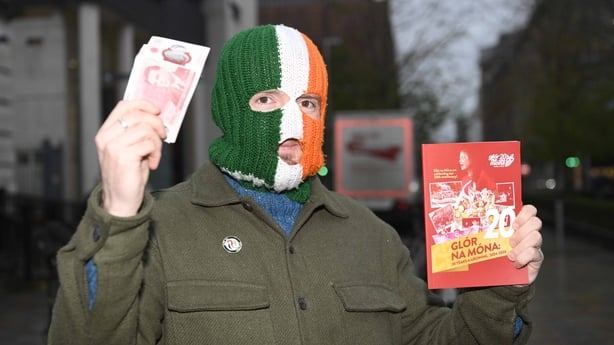Irish language rap group Kneecap has won its discrimination case over a decision by former Conservative minister Kemi Badenoch to refuse them funding.
Ms Badenoch refused to give them an arts grant while a minister in the previous Tory government in Britain.
Group member DJ Próvaí arrived at Belfast High Court in a repurposed RUC Land Rover for the short proceedings.
In a statement, the UK's Department of Business and Trade said it would no longer be contesting the case.
We need your consent to load this rte-player contentWe use rte-player to manage extra content that can set cookies on your device and collect data about your activity. Please review their details and accept them to load the content.Manage Preferences
Under the terms of the settlement, it agreed that the original decision had been "unlawful and procedurally unfair".
Kneecap said the case had never been about money.
"For us, this action was never about the £14,250, it could have been 50p," the group said.
"The motivation was equity. This was an attack on artistic culture, an attack on the Good Friday Agreement itself, and an attack on Kneecap and on our way of expressing itself," it added.
Kneecap will now receive the £14,000 (€16,000) grant and it will split it between two community groups - one on either side of the Belfast peace line.

Ms Badenoch has since become the Conservative Party leader.
The rappers' application for a grant from the Music Export Growth Scheme was said to have been shortlisted and approved by an industry panel.
But the final approval rested with the UK's Department for Business and Trade, and the Department for Culture, Media and Sport.
Ms Badenoch was at that time the business secretary and decided to refuse the funding.
The rap group claimed a provocative poster for their 2019 'Farewell to the Union' tour had angered the Conservative Party.
The UK government issued a statement confirming the end of the case.
It said: "This government’s priority is to try and reduce costs, and help protect the taxpayer from further expense, so we will not continue to contest Kneecap’s challenge as we do not believe it in the public interest.
"The music industry is the heart and soul of our economy and are committed to helping acts continue to thrive and break into new markets, including through our MEGS programme - which has helped around 400 artists tour the globe."

Speaking outside Belfast High Court, DJ Próvaí said it was an "affront to the courts" that the group had to take legal action to secure the grant award.
He added: "It is also an affront to the Tory government and the British Government that they felt they had to overreach in trying to stop a band getting funding.
"The broke their own laws in trying to stop us, nothing surprises me with the British government."
The group's lawyer, Darragh Mackin, said the court ruling was a "victory for arts and culture".
He said: "The unlawfulness of this decision was as clear as the nose on your face.
"The reality is that no matter how good the British government's lawyers are they couldn't put the genie back in the bottle in this instance.
"This is a victory for arts and culture, a victory for the foundation of the Good Friday Agreement."







